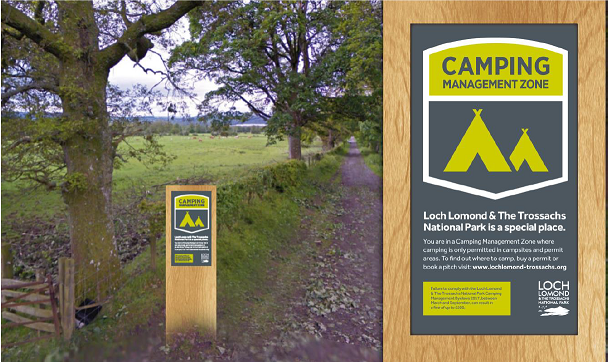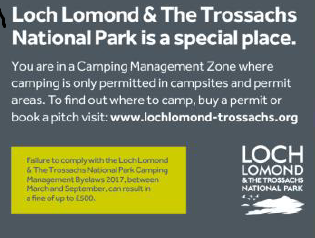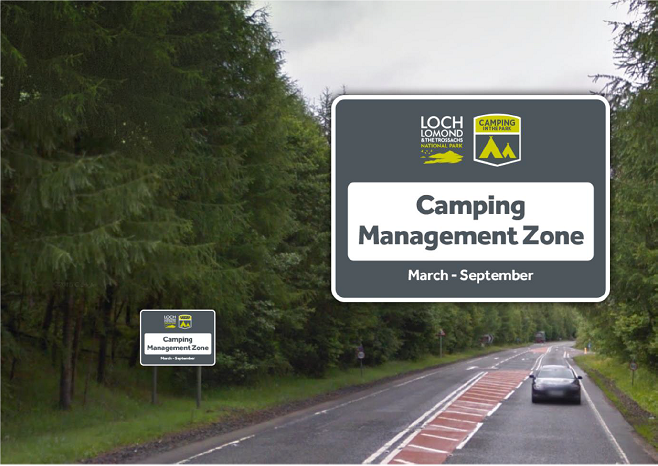
Anyone who cares about access rights in Scotland should read the Loch Lomond and Trossachs National Park paper which reveals how it hopes to implement the camping byelaws next March.

Its for the Board meeting next Monday and provides some explanation – not enough – of how the permit system will work, how it will be enforced and how the Park intends to hike camping charges up to £7 a night. There are three other papers that go with it, an illustration of the signage (see here) and papers on what powers will be delegated to staff (see here) and (and here). These raise more questions than they answer. This suggests either incompetence or that the important decisions are still being made at the secret monthly “briefing sessions” of the LLTNPA Board out of the public eye.
The implications for access rights

The first sentence in this paragraph is the most important in the whole paper. Scotland was meant to have the best access rights in the world but now the National Park has a unique power to limit one aspect of that right, the right to camp. It is now devoting a completely disproportionate amount of its resources to stamping out camping. A recent stakeholder revealed 30 full-time and 30 part-time rangers will be deployed to enforce the byelaws with £500 fines for those who try to camp without permits or outwith permit areas. The permit system has never been subject to any consultation: it was not part of the Your Park consultation and there is no mention in the paper of any consultation with the Local Access Forum, a statutory consultee.
The paper proposes a £3 a night charge for permits. The justification for this is as follows:

 The key point here is that the Park is going to use the charge to ensure “the areas are used responsibly”. Just think of the implications for access rights. Litter is dropped irresponsibly across the country from every Munro top to every road layby and all the verges inbetween. If charging campers for permits to pay for cleaning up after the irresponsible few is justifiable, then so is charging day visitors (how about a pass to go down the road to Rowardennan or what cost a Munro?) and every other activity which comes under access rights. This, if it goes ahead, will set a precedent for Scotland that undermines our access rights and the fundamental human right to freedom of movement. Byelaws were never intended for this purpose and its such a fundamental change to access rights it should have been debated in the Scottish Parliament. Chillingly the LLTNPA says they are “currently unique in Scotland” in their ability to issue permits and charge for access: the Park e has a long-term agenda, its submission to the Land Reform Review Group advocated that camping should be banned from all roadsides in Scotland and Board Minutes record that it intends to extend camping byelaws to the Loch Lomond Islands next.
The key point here is that the Park is going to use the charge to ensure “the areas are used responsibly”. Just think of the implications for access rights. Litter is dropped irresponsibly across the country from every Munro top to every road layby and all the verges inbetween. If charging campers for permits to pay for cleaning up after the irresponsible few is justifiable, then so is charging day visitors (how about a pass to go down the road to Rowardennan or what cost a Munro?) and every other activity which comes under access rights. This, if it goes ahead, will set a precedent for Scotland that undermines our access rights and the fundamental human right to freedom of movement. Byelaws were never intended for this purpose and its such a fundamental change to access rights it should have been debated in the Scottish Parliament. Chillingly the LLTNPA says they are “currently unique in Scotland” in their ability to issue permits and charge for access: the Park e has a long-term agenda, its submission to the Land Reform Review Group advocated that camping should be banned from all roadsides in Scotland and Board Minutes record that it intends to extend camping byelaws to the Loch Lomond Islands next.
While the paper claims that it does not intend to commercialise access rights, this is actually exactly what it is proposing. I don’t think any permit system is justifable in the National Park at present but if the Park is going to continue on this disastrous course there should be NO charges for permits because of the implications of doing this for the rest of Scotland.
Will permits prevent irresponsible behaviour?
The LLTNPA has never explained how permits will prevent irresponsible behaviour, which was one of the main justifications for the byelaws. The only thing the paper adds to our understanding of its position on this is it says permits will be issued together with advice on how to camp responsibly. The real issue though is what happens when a Ranger goes to a permit area and finds an abandoned tent, litter or a chopped down tree? The paper is completely silent on this. The first point to make here is that the permit scheme as proposed does not change anything in relation to irresponsible behaviour. If someone is caught in the act, the Rangers will still have to call the police, and if not the problem of deciding who did what remains. Nowhere in the paper though does it say what will happen to someone who is in breach of the permit conditions. Now if nothing happens, ie the next day the person can simply apply for and obtain another permit as long as they pay for this, this confirms that the charge for a permit is simply a charge for access. On the other hand, if the Park is proposing to ban people with records of irresponsible camping, there is not a single detail of how this would operate in the paper. Any “blacklist” of campers would have considerable civil liberty implications and raise many questions, such as rights of appeal etc which the Board would need to consider in public.
I think the Board needs to clarify their position on permits and irresponsible behaviour and that if there will be no new sanctions against irresponsible behaviour it should state this clearly. While there are already more than sufficient laws to address irresponsible behaviour, the new offence with £500 penalities and consequent criminal record will just apply to people who camp outwith permitted areas or without a permit. There is a fundamental injustice here: if you are caught littering you can be fined £100 under the Fixed Penalty Notice system which results in no criminal record. If however all you have done is camp without a permit you are £500 worse off and a criminal to boot. This is wrong and why the byelaws are fundamentally unjust. The byelaws penalise people for being in a place at a particular time rather for anything they have done. This is another reason why the Park’s proposals should have been scrutinised in the Scottish Parliament instead of being approved without any critical consideration by the former Environment Minister, Aileen McLeod.
Arbitrary Authority
The delegation of powers paper – and Park signage – makes it clear the Park intends to enforce breaches of the byelaws. The criminal offence consists of staying overnight in a camping management zone without a permit or outwith a formal campsite or lighting a fire. This shows up Simon Jones, the Park’s Director of Conservation, claim made on the BBC (see here) “I think its important Mhairi to say first of all its not a camping ban” for what it was……..Parkspeak.
However, its not quite as simple as that for two reasons. First, the Park papers propose to give staff powers to vary the number of permits up or down. The criteria for this is not given though its implied that permits could be reduced if the ground is worn. (This is nonsense, the permit zones are quite large and without fixed places for camping people can simply choose another place that is not worn – in fact the way to deal with worn grass is simply to put a sign up, as happens in campsites, asking people not to camp on the spot to let it recover. It is also hyprocritical given the destruction at Loch Chon (see here)– will the Director of Conservation now suspend camping at Loch Chon to allow the cleared pitches to revegetate?). I suggest this simply gives staff arbitrary authority to vary numbers of campers. The proposal should be rejected.
Second, at the Stakeholder Group meeting held last month the following was recorded:

So, the Park appears to be saying is that the byelaws won’t always apply. This is fundamentally wrong. If there were exceptions to the byelaws, for example, because of safety, these should have been stated in the drafting of the byelaws and clear procedures set out to determine when these circumstances might apply. Imagine you are cycling down the A82 in March, there is a storm and you are soaked through and you put up your tent for your own safety. Will you end up with a criminal record and £500 fine or not? These matters should NOT be left to the discretion of Park staff because if they are, inevitably the people who will get charged are the people whose face doesn’t fit. I don’t think there is any fix for this except for the Park making a commitment that it will charge no-one for breaching the byelaws unless they have also committed another criminal offence: so if you were camping without a permit and had left litter all around your tent you could be charged, but if you were camping according to the Scottish Outdoor Access Code, you would not.
Campervans
 The paper makes further meaningless noises about extending provision for campervans and mobile homes (the paper just refers to mobile homes) without saying there are just 20 places across the four management zones (I will come back to this in another post). In fact its failure to consider campervans in any meaningful way is yet another example of how poorly thought out these proposals are. Not a single example of the road signs mentions campervans. From the example above how would anyone know that staying overnight in a vehicle or indeed lighting a fire would be an offence.
The paper makes further meaningless noises about extending provision for campervans and mobile homes (the paper just refers to mobile homes) without saying there are just 20 places across the four management zones (I will come back to this in another post). In fact its failure to consider campervans in any meaningful way is yet another example of how poorly thought out these proposals are. Not a single example of the road signs mentions campervans. From the example above how would anyone know that staying overnight in a vehicle or indeed lighting a fire would be an offence.
There is a reason for this though and that is that while the Park wants to stamp out overnight stays, legally it cannot prevent vehicles stopping overnight either on the road or in certain laybys. Its likely therefore there will be places in the Management Zones where campervans will be able to stop legally. Now, this won’t be sufficient and is likely to involve large laybys on the A82 and other trunk roads which are the worst places for stopping off, but the point is the Park is not being transparent about this. People won’t know where they stand and the examples of signs given here are no help at all.
Charges for campsites – £7 for Loch Chon

This is what the Park said in their letter to the Minister in May 2015. 13 months later they want to increase the charge for campsite camping to £7 for Loch Chon and also their campsite at Loch Lubnaig. The paper omits to tell the reader that the current charge at Loch Lubnaig is £5 (and there are more facilities there) and that Sallochy, which Chief Executive Gordon Watson used as a comparator for Loch Chon, also charges £5. These are basic campsites. The paper says other larger campsites charge more. Well, Beinn Glas Farm at present charges £8 but for that you get free hot showers and a place to sit inside when its raining.
The Park staff are simply at it, or rather having to increase charges because of the totally unnecessary and extortionate costs they have incurred in developing campsites which don’t even have places for campervans.
And for your further edification, another example of Parkspeak
“The Respect your Park initiative was successful over the summer season”.
Respect your Park included campers and was addressed at issues such as visitors dropping litter. If the claim was true, there would be no need for any byelaws. Sadly, its nonsense. The Park creaked this summer due to the failure of the Park to install basic facilities like litter bins and toilets. Its not campers or even visitors which is the problem, its the National Park Authority which has failed to do what it was set up to do.
What needs to happen
The Board should:
- reject the proposal for a £3 charge for camping permits
- make a clear statement about whether the permits are intended to address irresponsible behaviour and if so how this might work
- reject the proposal that staff should be able to vary permit numbers and instead start a public consultation on the permit system
- make a public commitment that no-one will be charged for breach of the byelaws unless they commit another criminal offence
- reduce the proposed charge for campsite from £7 back to the £5 originally proposed
Unless the Board agrees this, Scottish Ministers should suspend the implementation of the byelaws for another year in order to consult on the implications for access rights.
I don’t normally ask readers to do things, although I have really appreciated letting me know about things they have taken up. If you believe though as I do that access rights are fundamental to citizenship, please consider contacting your MSP/s. The only MSP I am aware of at present who has spoken out about the camping byelaws in Patrick Harvie. You could ask them where they stand on the byelaws and that these matters are debated in the Scottish Parliament. Please also spread the message in whatever way you can.

Anglification ! This is another attack on our Scottish heritage. The relationship between the citizen and the land of our birth. The right to roam. There are adequate laws covering abuse of those rights. What there is not is the will to administer and enforce them. … There is absolutley no need for these bylaws… just another layer of colonial ownership, mastery and control over the natives …. ! I for one will roam freely as I please in my own country … and woe-betide anyone who tries to stop me!
Given the crime is “irresponsible behaviour,” and that means human interference with the natural order in a National Park, surely camping and access to the land on foot are the least of your worries? What about the adverse impacts of golfers and golf courses? What about the adverse impacts of boaters, moorings and marinas? What about the adverse impacts of events, concerts and other pursuits? What about the adverse impacts of agriculture, forestry and the fisheries? What about the adverse impacts of clown fish aquariums, shopping centres and giant car parks? What about the adverse impacts of hydro-electric schemes and water management? What about the adverse impacts of the non-camping population?. Are they banned and outlawed? Not yet.
I get it. “A wee conviction always helps to clear the air.” They need to make an example out of someone to demonstrate their power and control. It’s a warning to the rest of “the irresponsible.” You need to know how the ruling class think. We are disposable.